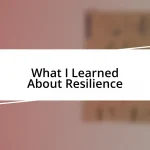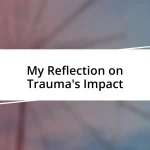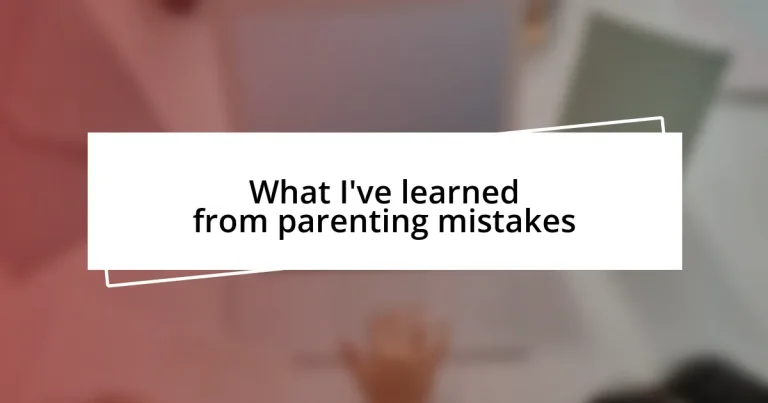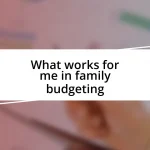Key takeaways:
- Parenting mistakes can seriously impact a child’s emotional landscape, diminishing trust and creating emotional disconnect.
- Open communication and modeling emotional regulation strengthen parent-child relationships and foster a nurturing environment.
- Encouraging problem-solving and allowing children to face challenges builds resilience and confidence.
- Sharing experiences with other parents creates a supportive community and enhances personal growth through vulnerability.
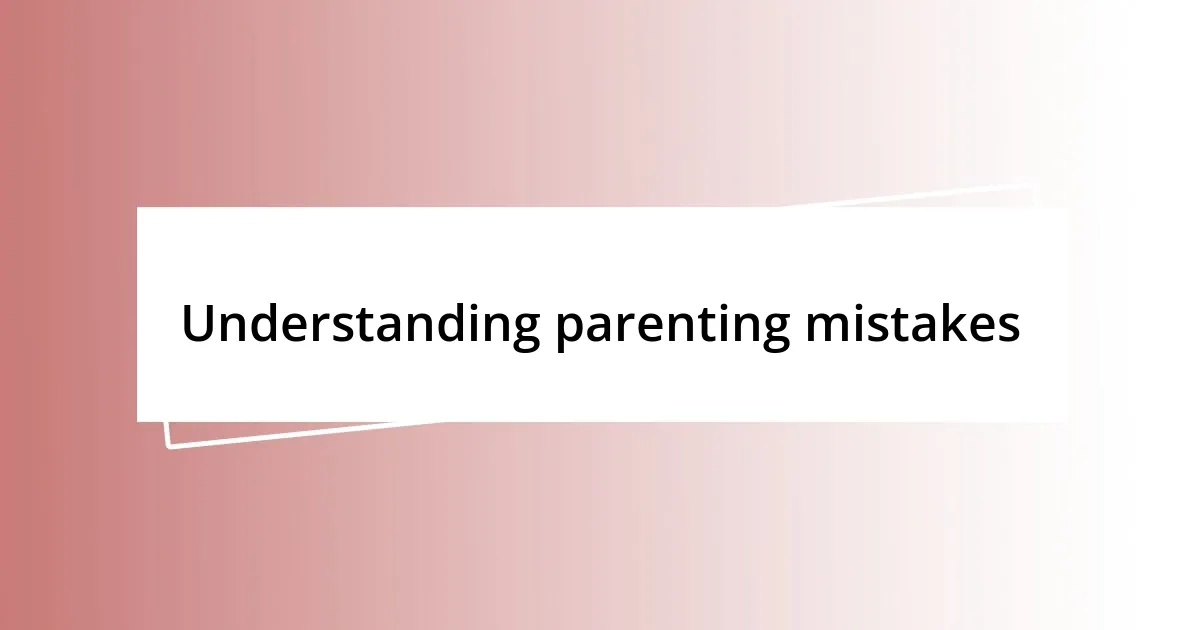
Understanding parenting mistakes
Parenting mistakes can often feel like hidden traps that we stumble into unknowingly. I remember a time when I raised my voice out of frustration, only to see my child’s eyes widen in confusion and fear. In that moment, I realized that my reaction not only affected my child but also shattered the trust we had built.
It’s interesting how we can be incredibly aware of our flaws yet still make the same mistakes repeatedly. Think about it: have you ever found yourself repeating a pattern from your own upbringing? I did when I found myself dismissing my child’s feelings, thinking I was helping them toughen up. This led to a heartbreaking moment when my child crawled into my lap, tears streaming, seeking comfort I wasn’t prepared to provide.
What I’ve come to understand is that every mistake offers a lesson wrapped in its own unique challenge. I recall a day when I forgot an important event, leaving my child disappointed and feeling undervalued. It hit me then that being present is as crucial as any advice I might give. Isn’t it fascinating how our children’s reactions can teach us about ourselves and our parenting journey?
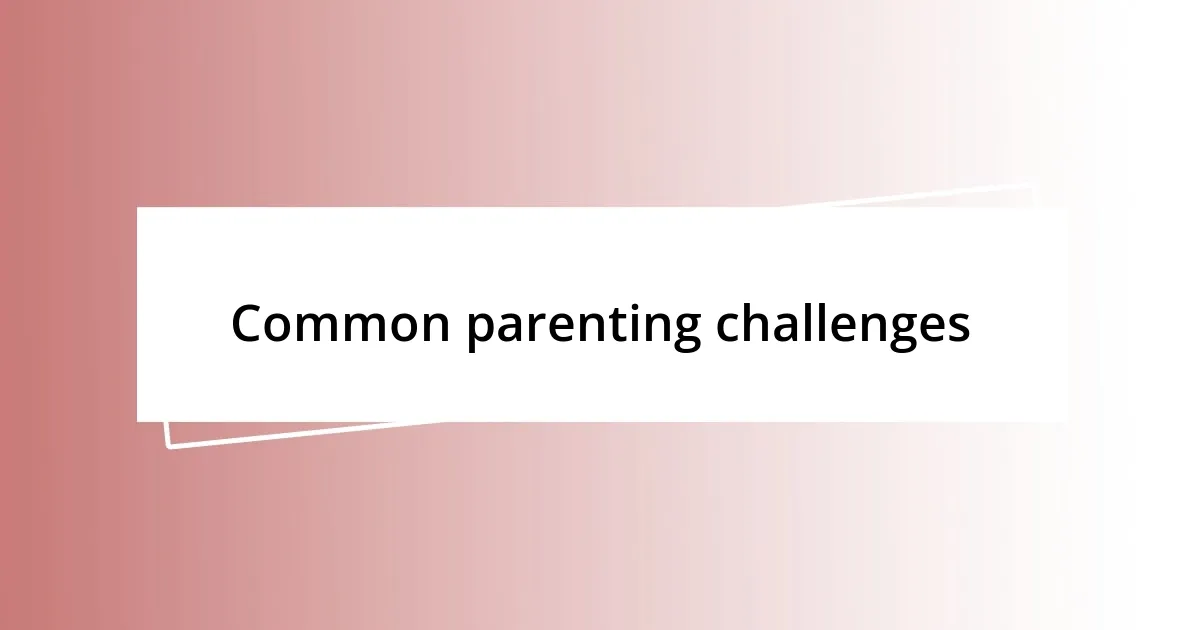
Common parenting challenges
Sometimes, I face the challenge of balancing my own needs with those of my children. I remember a particularly overwhelming week at work when I prioritized deadlines over family time. In the end, I felt drained and my kids were left feeling ignored. That taught me the vital lesson that self-care is not selfish; it’s essential for being the parent my children deserve.
Another recurring issue is the struggle for consistency in discipline. There were days when I was firm with boundaries, and others when I gave in to my child’s pleas. I learned that inconsistency creates confusion for them. On one occasion, after I’d said no but then permitted a late bedtime, my child started testing limits every night. This taught me that clarity in my expectations helps them feel secure and understand the boundaries we set.
The challenge of communication can often feel like a tightrope walk too. I recall a moment when I tried talking to my teenager about their feelings, and they shrugged me off. It hit me hard, realizing that sometimes it’s not what I say, but how they perceive it that matters. Open dialogue is not just about talking; it’s about creating a space where our children feel safe to express themselves.
| Challenge | Impact |
|---|---|
| Balancing Needs | Creates feelings of neglect |
| Inconsistency in Discipline | Leads to confusion and testing of limits |
| Communication | Can hinder open expression |
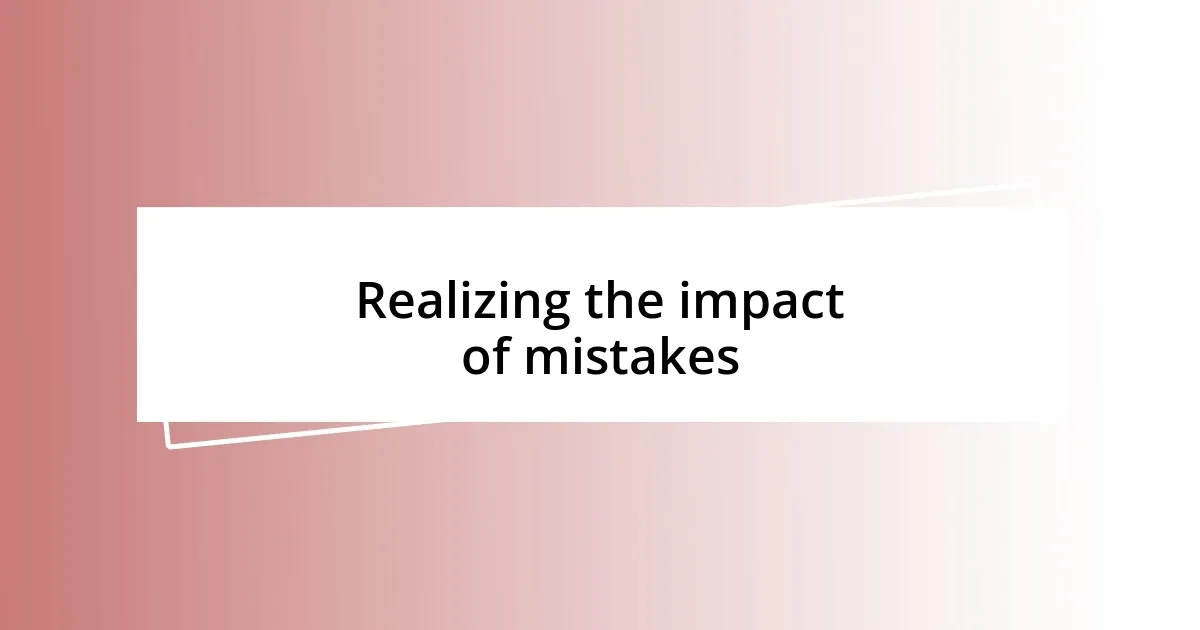
Realizing the impact of mistakes
It’s often a tough pill to swallow, but realizing the impact of our parenting mistakes can be eye-opening. I remember a time when I dismissed my child’s excitement about a school project as trivial. The look of disappointment on their face was a wake-up call for me. In that moment, I understood that my words held weight and could either lift them up or bring them down.
Here are some key reflections on the impacts of our mistakes:
- Diminished Trust: Children may hesitate to share their thoughts if they feel dismissed.
- Emotional Disconnect: Failing to acknowledge their feelings can create a rift, making them feel misunderstood.
- Reinforced Negative Patterns: Mistakes can set a precedent, causing children to internalize those behaviors.
- Lost Opportunities for Connection: Each oversight might steal a precious moment of bonding that can’t be regained.
Every choice feels magnified when you realize how deeply they affect your child’s emotional landscape. The truth is, acknowledging these missteps leads us on the path to better understanding—not just for ourselves, but for our children as well.
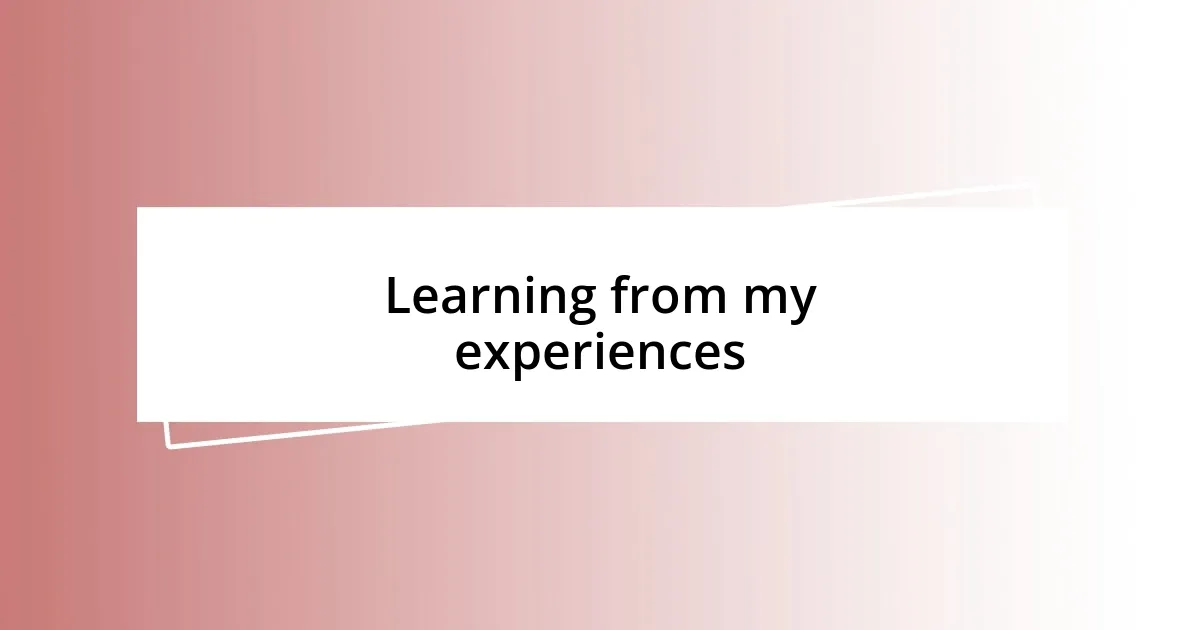
Learning from my experiences
Learning from my own parenting experiences has been both challenging and eye-opening. I vividly recall the day I snapped at my child after a long day, only to see their smile evaporate. It struck me when I realized that my redirecting their excitement toward my stress had created an emotional gap between us. In that moment, I learned the importance of my immediate reactions and how they shape our connection.
Another instance that taught me a lot about myself was when I initially struggled with taking responsibility for my mistakes. One night, I overreacted during a harmless, playful moment that spiraled out of control. Watching my child’s hurt reaction made me reflect on why I reacted that way. It highlighted how crucial it is to model accountability and vulnerability. Children learn not just from our successes but how we cope with our failures, don’t you think?
As I continue on this parenting journey, I find myself constantly revisiting my past mistakes. One particularly frustrating evening, I aimed to control the chaos rather than creating a calm environment. It made me realize how my need for control often led to resistance, especially in my children. This experience has taught me to embrace flexibility and trust my kids to navigate their own emotions while I guide them.
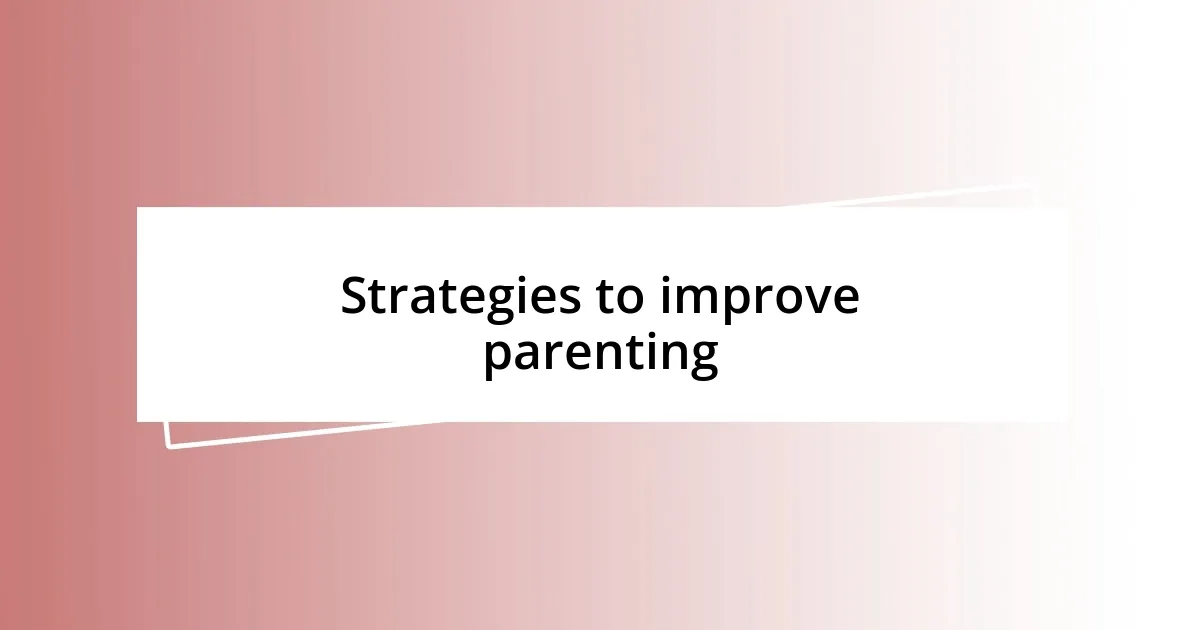
Strategies to improve parenting
One strategy that has proven invaluable is prioritizing open communication. I used to think that being the “authority” meant I had to have all the answers, but I’ve found that encouraging my kids to share their thoughts has led to deeper understanding and trust. Recently, I asked my child how they felt about a particular family decision, and their honesty opened up a dialogue I hadn’t anticipated. It made me realize just how much their voice matters.
Another approach I’ve embraced is modeling emotional regulation. After an incident where I lost my temper while juggling multiple responsibilities, I felt terrible when I saw the fear in my child’s eyes. I later sat down with them to apologize and explain my feelings. This simple act not only demonstrated my vulnerability but also allowed my child to see that it’s okay to acknowledge and express emotions. Have you noticed how much more open children can be when they see us navigating our own feelings?
Lastly, I aim to create a nurturing environment that celebrates small victories. There was a time when I focused solely on achievements, overlooking the everyday efforts my children put forth. I decided to change that. By recognizing their attempts, whether it’s finishing homework or helping around the house, I’ve not only boosted their self-esteem but also strengthened our bond. Isn’t it amazing how a little acknowledgment can transform the atmosphere at home?
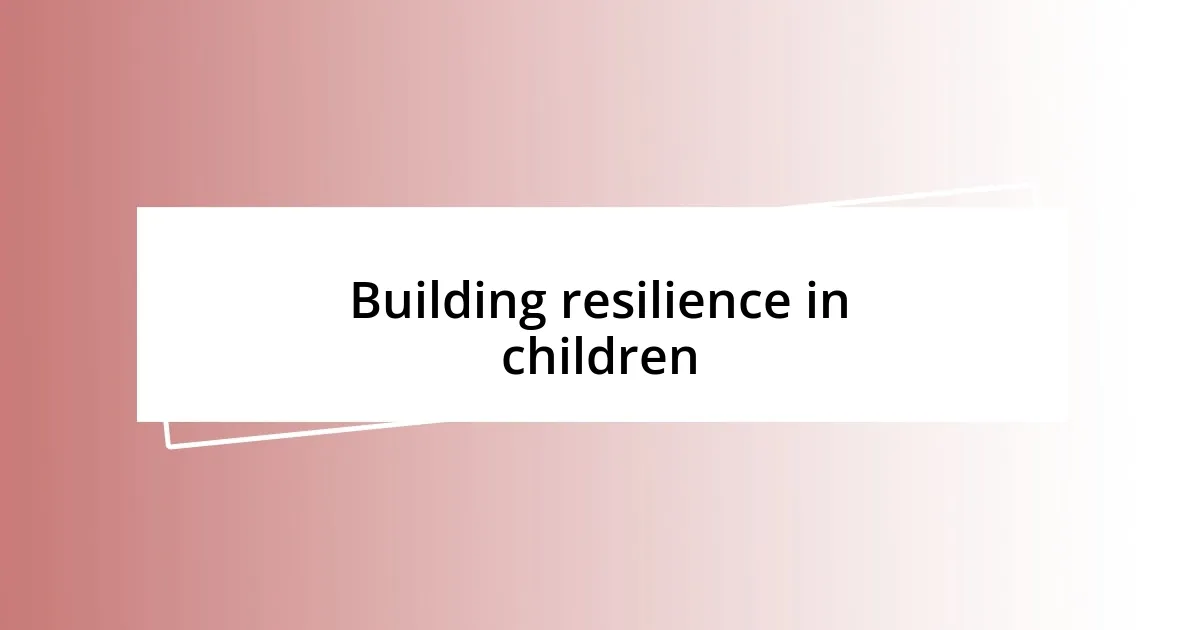
Building resilience in children
I’ve come to realize that teaching resilience starts with letting children face challenges. I recall a moment when my child wanted to ride a bike without training wheels. My instinct was to hold on tight, but I had to step back and let them wobble. Watching them struggle initially was tough, but seeing their determination to keep trying was such an eye-opener; they learned that falling isn’t the end—it’s a part of learning and growing. Isn’t it empowering when kids realize they can overcome obstacles on their own?
Another essential aspect of fostering resilience is encouraging problem-solving skills. Not long ago, my child faced a tough school project, and my first impulse was to jump in and offer solutions. Instead, I decided to ask guiding questions: “What do you think you should do next?” This approach invited them to think critically and develop their strategies, and I was blown away by their creativity. Watching them tackle problems independently fills me with pride—don’t you think that giving kids the tools to navigate difficulties builds their confidence?
Resilience isn’t just about learning to face challenges; it’s also about cultivating a growth mindset. One evening, during a particularly intense moment of frustration with homework, I noticed my child wanted to give up. I shared a story from my own life—how I struggled with math in school but persevered until it clicked. It was a simple conversation, but it sparked something in them. That little connection we made ignited their desire to push through. Moments like these remind me how our experiences can serve as powerful lessons for our children.
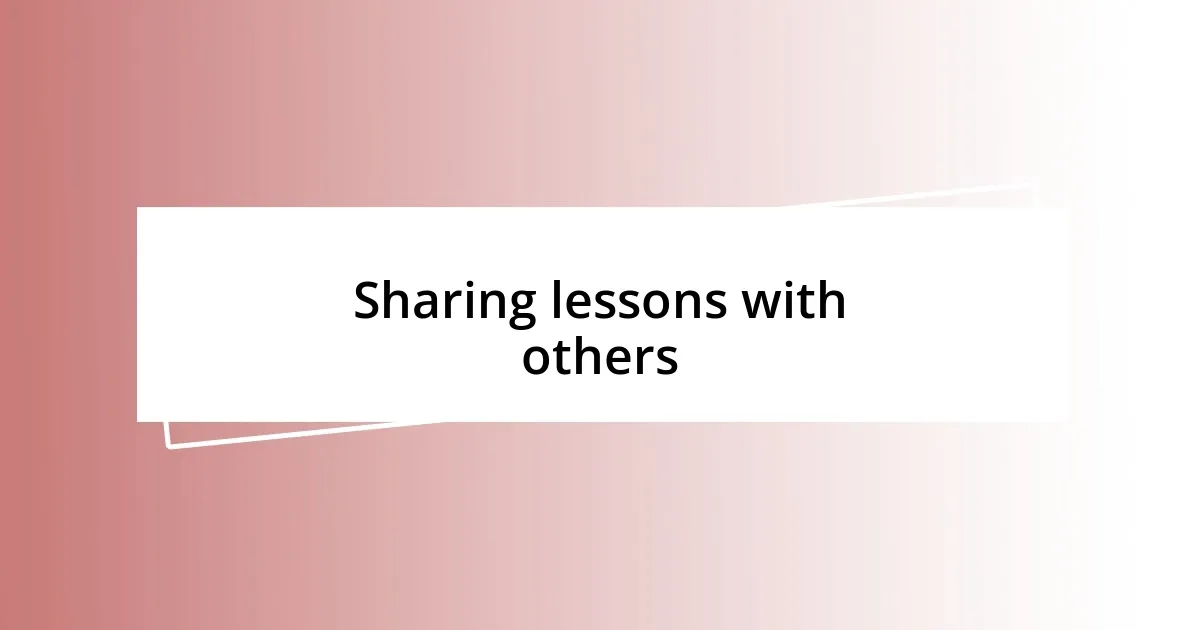
Sharing lessons with others
Sharing lessons with others is something I genuinely find rewarding. I remember sitting with a group of parents at a school event, sharing my experience of a parenting misstep I made when I forgot a significant event in my child’s life. As I recounted that moment of guilt, a few parents nodded in understanding, revealing their own similar stories. It was a powerful reminder that we all stumble, and our collective experiences can offer comfort and support to one another.
Then, there was the time I wrote a blog post about my struggles in managing screen time. I hesitated to hit “publish,” fearing judgement, but the feedback was overwhelmingly positive. Parents reached out to share how they navigated that same challenge. Hearing others echo my thoughts felt liberating; it reinforced the idea that by sharing our triumphs and missteps, we create a space for open dialogue and connection.
I often wonder how I could have navigated parenting differently if I had known some of the lessons I’ve learned earlier. Reflecting on my journey, I’ve come to see that sharing my stories not only helps others but also fosters my own growth. Each time a parent tells me that my experience resonated with them, I realize that vulnerability is not a weakness; it’s a bridge that connects us in our parenting journeys. Have you noticed how powerful it is to open up and reflect together?
